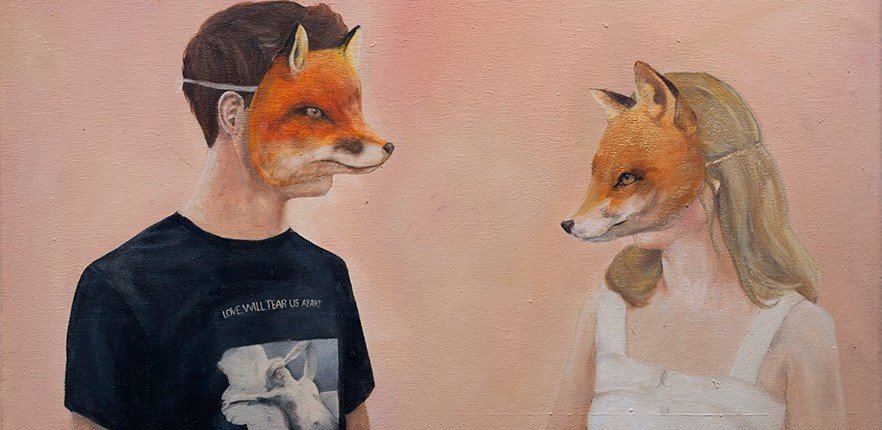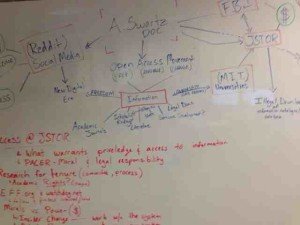Before I get up on a digital soap box, or maybe on my IBM PCjr. –the 80s computer geeks equivalent- I wanted to just say wow, that was inspirational stuff right there for anyone who is even remotely engaged with the world around them and especially interested in where we are headed in education, or better yet, the process of critically thinking about ourselves and the role we play in the world around us. Any way you spin that talk, Campbell drove it home when he was breaking down this idea of “networked transcontextualism” being key to learning and understanding, primarily because it is comprised of “some deep experience, of the richness, the complexities of the ecologies of yearning, that inform our desire to make meaning out of our experience, which we must do together; (and here he paused only for a blink and said with an unmistakable honest joy) because that’s where meaning lies”. Again, wow!
Now to connect this back to a point I wanna make, which is how awesome this all is and how lucky I am, again, to be engaging with so many great people about things that I have now become time-consumingly passionate about: writing, literature, teaching, but most of all the ways in which we can effectively engage with and further the 21st century learners’, students’ and educators’ abilities; I must bring in a bit of my own transcontextual material stemming from time I served in the educational system as an adolescent and what it is that really motivates me to want to do more with all this cool stuff.
Without further ado, my story leading up to this goes a lil somethin’ like this:
So, being that I am a product of old school methods that conditioned us to sit in rows and the emphasis was always put on what you did as an individual and not a collective whole, I was never a fan of getting in groups, riffing off others or even considering what others had to say in the way of my thoughts. “What thoughts were ever solely mine anyway, right? As if peers of all walks had anything to do with my awesomely unique thoughts…silly boy.” But again, it was what I knew at the time and it was supposed to be that way…or so I thought.
As I matured from the elementary and junior high level to high school, and I use matured loosely, I was presented at every turn with, what I would come to define later in life as, painted cattle guards – sets of rules or ways of being that are then imposed on you that present themselves as genuine hurdles or road blocks to overcome, but in reality completely conquerable with a little push back in the form of questioning, considering possibilities, thinking deeply about the issues as a unit to overcome this obstacle in front of us or whatever approach you choose. In short, not faking the “double take”, right?.
Yet still, even with a new self and voice I felt like I had acquired during this time, the educational conditioning I received made me feel at times like I was a child who was to be seen and not heard; spoke only when spoken too. Not every educator I came across fits this negative image I’m painting, obviously, but as I moved through high school, it seemed to be more and more evident that this was the model that had been passed down and preached. My most memorable, and ultimately inspirational, of these interactions with changeless educators was in my junior year when I failed a poetry test based on my opinion of the author’s intentions/meanings. When I asked the teacher why I failed, she told me it was “Because that’s not what the scholars say that poem means”. Ouch! Not only was I wrong, but she made me feel, at the young impressionable age of sixteen or seventeen, like what I had to say maybe didn’t matter, and there were plenty of smart people, “scholars” –whatever the hell that word meant to me at the time- ,that knew far better than I did. Needless to say, that may be inspirational now, but at the time it made me go from being an A student to a C and D student because I lost the confidence to speak my mind and question the things around me and comment on the things I knew the answer to. Again, not all were like this, or even many, but enough were like this to where a change in the guard was necessary but not in sight.
It wasn’t until I went to Shasta and Butte College to finish my general ed before transferring to Chico that I finally had a chance to express my thoughts on something I wanted to talk about and in the way that I wanted to say them. My English professors at the time, Tony D’souza at Shasta and then Sarah Pape at Butte, both had a way about them that was inviting, engaging and yet eager to learn from you as a student, which in turn pushed you to not only do what they asked, but to do it to the best of your ability because you knew they sincerely cared…or just faked it really really good. Still though, when I talk to these professors, just as I would with anyone who I’ve come in contact with and grown through, I thank them for everything they’ve done and remind them that the time spent with them in their classes and outside of it are what gave me the extra push I needed to pursue furthering my education and become the aspiring scholar, educator, colleague, friend and human I aim to be.
What’s important to note about this positive change that we come to expect from going between high school and college is it didn’t come for me until I was in my late twenties, so you can imagine how different the classrooms were in a ten to twelve year span, as well as the person that I had become –not to mention I went from hustlin’ in the streets, to hustlin’ mattresses for Sleep Train, to physically hustling to get my education done as the economy fell around me, my wife and two kids (now three). What I aim to point out with this bit of info is that it wasn’t all the changes in me and society that made these professors awesome at what they did –and many who follow them as I continued- it was/is their understanding of the materials that they were working with and their ability to engage the student on a real level through their own secret superpowers. Adding to this was the fact that they were incorporating the tools and technologies of the time to better support and promote deeper thinking and the sharing of ideas –i.e. by building around communities of practice and creating affinity groups before it seemed to take hold, using new theories around revision and workshop, introducing us to different forms of media and mediums and being knowledgeable about the current events, television shows or music or movies that appealed to different demographics, connected us to the locale through civic engagement, and the topper, they were normal people who never forget what it was like and for them and what it means to be a student in present day… also, not necessarily digital tools either.
All this sounds very basic and normal now, but as we can see from Campbell’s Keynote in 2012, D’souza and Pape were ahead of their time, as were the educators who taught and paved their way. What they took from the people before them and incorporated into their own styles was the key component that Campbell is pointing to when he talks about transcontextual materials being important. It’s the idea that these seemingly insignificant and irrelevant ideas that arise from reading and discussing, let’s say, William Faulkner or Charles Bukowski or Lev Vygotsky or James Gee, in relationship to things that you understand and know about the world around you are key. Your ideas may not be what the scholars think, but that’s because you don’t think like anybody else; you’re an individual with your own ideas and emotions which in turn will change the way we as a whole look at whatever or whomever that may be in the discussion.
Okay, phew, (wiping the sweat from our brows-ers), we made it through my sad existence in the unified school districts of San Jose and were forced through my reentry into the college system; so if you’re still here, then you must of followed the tangents fine and are ready to wrap this up.
For me, the educators that stick out in my mind are those that are doing something that everyone else looks at as crazy or feels their ideas are just a little too far outside that invisible box we keep trying to push them out of but packing taping them in when we don’t agree with or understand what they’re saying. You see a little connection now? My whole thing is is that I’m fascinated by all this new “stuff” I’m learning and am just so eager to keep this ball of excitement rolling inside me and can’t wait to see what the future will bring. Now that I have barely got wet and tipped my toe in the deeper waters –this blog thing here- I feel like I’m learning to take the floaties off and venture further, yet I can’t help but think about Edna Pontellier of Kate Chopin’s “The Awakwening” and imagine myself in her position, looking back at the shore we’ve left behind and swimming further, until –in my case- I hope to get picked up by this ship we’re building together; otherwise it’s the smell of pinks filling the air and the sounds of bees buzzing in my ears, ’cause there’s no turning back now.
I just want to say thanks for reading, I hope you enjoyed it and sorry for the lengthy piece, but this was a free flow of info and emotion that I didn’t want to quit, brought on by Gardner Campbell’s talk and it seemed fitting to just go with it. I leave you to think on this for yourself now:
What motivates you to want to “make the thing (whatever it is for you) not suck”?
–paging Dr. Jaxon, I stole your line; it’s just that good.



